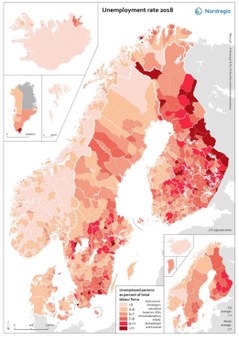Labour Market
Competition from Norwegian changes the Nordic aviation market
Developments in the aviation industry have presented new challenges to politicians, employers and trade unions. Deregulation and increased competition makes it cheaper to fly, which means increased growth. But market conditions could end up being tougher than the partly state owned airlines can handle.
Editorial: Changing media and redundant journalists
Are the big media corporations panicking in the face of changing media habits when redundancies spread across the industry? Falling classifieds revenues, budget cuts and fewer readers are shaking Nordic newspaper houses. Jobs are cut across the board and senior writers take early retirement, bidding a sad farewell after serving society for many years. What is happening?
Print shrinks as advertising goes online
Newspapers are the fastest shrinking businesses in the USA according to a LinkedIn survey. The social network has looked at their members’ stated occupations. The number of journalists fell by 28.4 percent between 2007 and 2011. Europe and the Nordic countries are right behind this trend.
Denmark’s media storm
Experts and newspapers warn of the death of even more print media and a decline in the quality of news ahead of political negotiations on moving state media support from printed to digital media. The government calls it necessary change.
Jobs disappear before the ink is dry
Finnish journalists have faced major changes in recent years - many of them negative ones. Jobs are disappearing and media owners’ visions for the future are bleak.
Ole Jacob Sunde: the important thing is the media - not whether news is printed on paper
“The most important thing is to have good platforms and sources of information where you find important and relevant news and stories presented with integrity. Which medium is being used is less important in the long run. We should make use of technology,” says Ole Jacob Sunde, chairman both at Schibsted and the Tinius Trust.
Iceland's new labour market policy focuses on young men
Iceland is developing a labour market policy for the period leading up to 2020, the first such policy the country has ever had. There are more people with low education in Iceland than elsewhere in Europe. Experts say the most important thing now is to develop a strategy for educating young men.
Karl-Petter Thorwaldsson: I believe the future is Nordic
As the EU focuses intensively on the Euro and other economic problems, it has never been more important to intensify Nordic cooperation says the new President of the Swedish Trade Union Confederation (LO), Karl-Petter Thorwaldsson.
Culture increasingly important for employment
Culture plays an increasingly important role in employment. Cultural and creative trades employ five million people in Europe and represent 3.3 percent of the total EU economy.
One in four Icelanders in creative jobs
The culture, entertainment and experience industry is increasingly important in Iceland. The country’s single most important cultural industry is music.
How to increase equality in Norway
From next year Norway increases parental leave to 49 weeks. Yet months of daddy leave and nursery places for all children do not automatically make for a less gender segregated labour market nor does it make the male dominance in top jobs disappear, warns Professor Hege Skjeie, who has been heading the largest report on equality in Norway so far.
Nordic worry over EU internal market package
The European Commission’s proposal for how to apply the EU directive on the posting of workers must not limit our powers to control foreign companies! That was the unified message from government officials, authority representatives, the social partners and researchers from all Nordic countries when they met in Oslo to discuss how to deal with what remains of the the so-called internal market package.
Strengthening Nordic welfare state cooperation
Youth unemployment is a worry across the Nordic region. When Nordic labour ministers met in Svalbard recently they agreed to identify the good examples where employers help include young people out of work and education.
Challenges to welfare state at top of ministers’ in tray
Youth unemployment has high political priority in the Nordic region. At the latest Nordic Council of Ministers meeting, labour ministers agreed to encourage employers to take on some of the responsibility for young people who don’t work and who are not in education.
Finland’s comprehensive social guarantee for young people
The Finnish government is rolling out a comprehensive programme aimed at young people. The social guarantee aims to offer all under-25s and all newly educated under-30s a job, study place, apprenticeship or rehabilitation within three months of the young person becoming unemployed.
Catapulted into work?
A youth project in Åland called Catapult is aiming to integrate unemployed youths into the labour market. The name might sound a bit more dramatic than what actually faces its target group of 16 to 24 year olds. But it does say something about Nordic politicians’ expectations.
New drive to get young unemployed Danes into education and jobs
The Danish government launches another youth package to offer education to nearly 100,000 young people on benefits - many of whom have no further education at all. Meanwhile the effects of previous youth packages are beginning to materialise.
Emergency rescue plan for Denmark’s long-term unemployed
The debate over Danish unemployment benefit rules carries on despite political action.
Editorial: Can apps open the door to a new working life?
The mobile telephone is one of the best examples of Nordic cooperation there is. The use of the same standards across Denmark, Finland, Norway and Sweden created a market which was big enough to allow companies like Nokia and Ericsson a head start and to become major exporters.
Document Actions



 Follow us on Facebook
Follow us on Facebook
